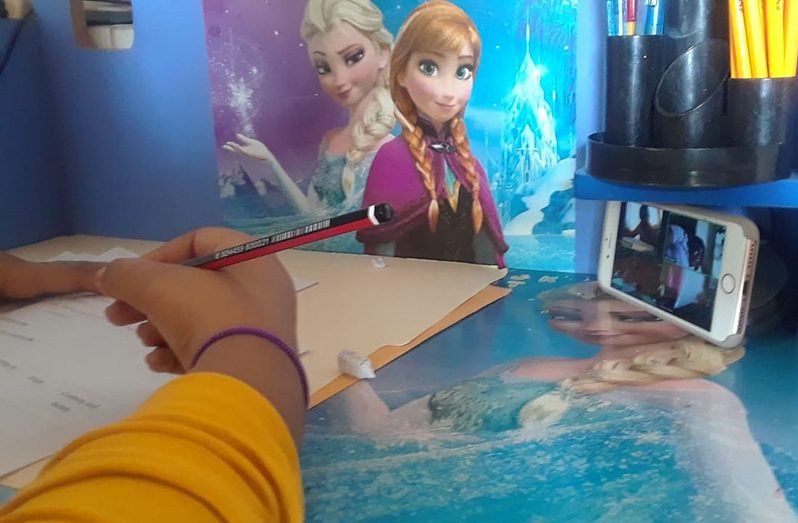– Psychologist says focus must be placed on how students are coping
THE seemingly unavoidable challenges of online learning, coupled with the pervasive emphasis for good test performance can be stressful for learners contending with the COVID-19 pandemic, according to local psychologist, Wil Campbell.
In a recent interview with the Guyana Chronicle, the psychologist related that there are a number of inherent challenges in the virtual teaching and learning environment which may be stressful for both learners and teachers. Many of these challenges disproportionately affect learners, in particular.

The first fear, which can lead to stress, is the fear of disconnection. This may be caused either by limited, unstable or even no internet connectivity; it may also be caused by power outages (commonly called blackouts).
Campbell contended that a blackout is “more stressful” because there is generally an uncertainty about when the power will return, and beyond disrupting virtual learning, it can cause discomfort.
“Our society focuses heavily on test performance and the threat of missing out on content, or on a class weighs heavily on students in general. The idea is that you miss this and that you could not have what you need to perform well on the next test,” Campbell said.
Beyond resulting in stress, these disturbances may also hamper learners’ motivation for school. Missing out on school work, the psychologist explained, could have adverse effects on the learners’ drive for school.
One pharmacy student of the University of Guyana (UG), who prefers to remain anonymous, told the Guyana Chronicle that she feels less motivated to attend a class if she experiences a power outage, even if power was lost for just a few minutes.
“When there is a blackout, I don’t feel like going back to class. It’s like my entire mood just changes and internet school is already somebody that I really need to motivate myself to do.”
A study entitled, “Challenges of Online Education during COVID-19 Pandemic in Nepal” done by psychology lecturers, Kavita Khati and Khem Raj Bhatta, also raised this concern of learners’ motivation. One student interviewed for the study stated virtual learning feels as though there is more of teacher talking and less of interaction.
Since March, schools have been closed to mitigate the spread of the new coronavirus in Guyana. Learning shifted to the online setting, which was seen as one of the few options that could facilitate engagement at the time. The Ministry of Education, however, made the decision to conduct a phased reopening of schools, starting with Grades 10, 11 and 12 and the Technical Vocational Institutions, from November 9.
“We can’t allow our children to drop out because of the absence of engagement from March to now,” said Minister of Education Priya Manickchand emphasised, while visiting reopened schools recently.
Subsequently, she explained that the ministry, and by extension the government, is tasked with ensuring that the COVID-19 pandemic does not augur long term implications for learners. Of grave concern is whether students have “dropped out” to support their families or because of the protracted period away from school.
According to Campbell, learners who already do not possess all the resources they need in order to adequately benefit from online learning, such as a fast internet connection or a steady supply of electricity, if any at all, are further disadvantaged.
“In the hinterland in particular, there are certain parts where they may not be much connectivity and there are other parts where students may have to travel for miles and for hours to get to a hotspot or something of that nature,” he said, adding, “I feel like it is unfair to those persons to require them to meet the same expectations as those persons who have lightning fast internet.”
In Aishalton, Region Nine, one teacher, Mary Thomas, told the Guyana Chronicle previously that all of her students do not hail from the same community, but rather a collection of surrounding yet distant communities. Internet connectivity and even having smart devices have been a challenge.
Earlier in the year, she attempted to distribute booklets, with practice questions, ahead of the Caribbean Secondary Education Certificate (CSEC) examinations. Since she did not have enough booklets for her 25 students, she allowed them to use the booklets, and when they were done, she loan them to another group of students.
She also created a WhatsApp group with those students who have cellphones to work on questions and conduct revision. It is not unbelievable that the students did not respond with much alacrity, as related by Thomas.
Recognising some of these inherent disparities, the Education Minister explained that, since taking office, a few months ago, her Ministry began distributing worksheets and tapped into broadcast media in order to facilitate the learners.
Even so, Campbell stressed that the prevailing circumstances require almost a herculean effort from learners.
“I think it will require a mindset that says ‘If I don’t make it this time, I will be able to make it sometime down the road’ or something of that nature,” he said. But, he also lamented that Guyana’s educational system and culture do not necessarily provide “options” for learners, given the great emphasis placed on garnering good test scores.
The modified approach of engaging in only multiple choice testing taken by the Caribbean Examinations Council (CXC) this year, illustrated that the education system can adapt, Campbell said. Though that approach has been criticised by some persons, the psychologist was of the opinion that the modification could augur for re-examining the education system, to reduce the “pressures” students are placed under.
“I feel like this is a good opportunity going forward, even beyond the pandemic and when we go back to our face-to-face settings, I think that we need to take another look at the quantity of content we do and look more at teaching for mastery and helping students to understand concepts,” he related.











